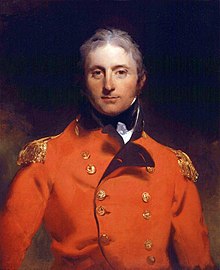John Moore (British Army officer)
| Sir John Moore | |
|---|---|

Portrait, oil on canvas, of Sir John Moore
by Sir Thomas Lawrence (1769–1830) |
|
| Born | 13 November 1761 Glasgow, Scotland |
| Died | 16 January 1809 (aged 47) A Coruña, Galicia, Spain |
| Allegiance |
|
| Service/branch | British Army |
| Years of service | 1776 – 1809 (DOW) |
| Rank | Lieutenant-General |
| Battles/wars |
Anglo-Russian invasion of Holland |
| Awards | Order of the Bath |
| Other work | MP for Lanark Burghs |
Anglo-Russian invasion of Holland
French campaign in Egypt and Syria
Lieutenant-General Sir John Moore, KB, (13 November 1761 – 16 January 1809) was a British soldier and General, also known as Moore of Corunna. He is best known for his military training reforms and for his death at the Battle of Corunna, in which he defeated a French army under Marshal Soult during the Peninsular War. After the war General Sarrazin wrote a French history of the battle, which nonetheless may have been written in light of subsequent events, stating that "Whatever Buonaparte may assert, Soult was most certainly repulsed at Corunna; and the English gained a defensive victory, though dearly purchased with the loss of their brave general Moore, who was alike distinguished for his private virtues, and his military talents."
John Moore was born in Glasgow, the son of John Moore, a doctor and writer, and the older brother of Admiral Sir Graham Moore. He attended Glasgow High School, but at the age of eleven joined his father and Douglas, the young 16-year-old 8th Duke of Hamilton, (1756–1799), his father's pupil, on a grand tour of France, Italy and Germany. This included a two-year stay in Geneva, where Moore's education continued.
...
Wikipedia
